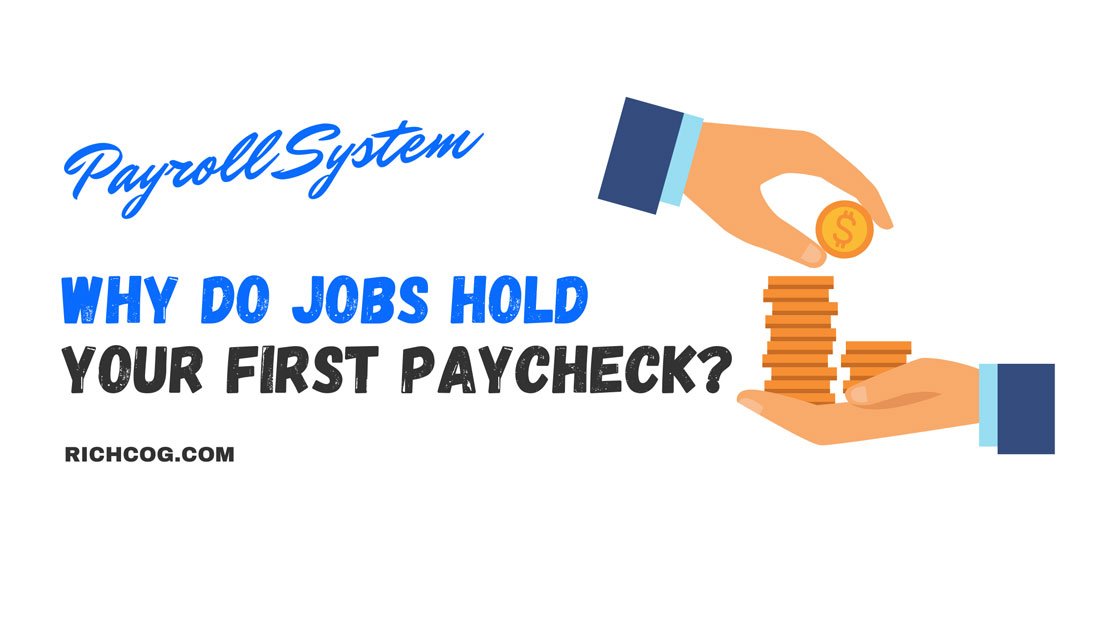When we got the job, we are always excited about our paychecks, and it can be frustrating when it’s your payday, you expect your first payment, but you’re being denied.
In this article, we are going to talk about why do jobs hold your first paycheck & On the other side do companies hold your first paycheck, is it legal?
After all, the major joy of the employee and the purpose of the work they do is in their paycheck, and make some money to cycle our lifestyle, right?
So why do employers hold first paycheck and kept on holding? is there something unusual going on or you’re just freaking out.
When starting a new job in the past, my employer holds back one week’s pay of the 2-week pay cycle.
But late on I knew It’s just standard operating procedure. It’s cruel to hold back a full 2-week’s pay, I don’t object to the one-week being held, a sort of savings.
But I always get back the pay that was held when I quit. Now you all are wondering why do jobs hold your first weeks pay?
Don’t worry, we’ll discuss everything here one by one.
Why Do Jobs Hold Your First Paycheck? [Truth]
Well, When we talk about the legal rules, especially in the United States. Employers don't have any right to hold the payment of the workers in any kind of situation.
Most of the time, a lot of companies roll out paychecks to their employees on the exact day.
But if you are a new employee, then the paychecks can come a little late because an employer may need to complete all paperwork before paying it.
Everything is dependent on the system that the company adopts which is pretty much similar for every new employee.
Also, In the other case, If a new employee does not start the job early, maybe he/she started in the middle of a pay period, an employer can decide to hold that employee’s first paycheck.
Some employers only pay according to the number of days worked for. But It's not simple as you think, so let's dive in a little because there is a lot of misconception about this topic.
Why Do Employers Hold Your First Paycheck? Company Process
A lot of people have a big question on their mind, why do employers hold first paycheck? But my mind is like bubbling around, do they? Really?
First for the most to clear things out.
You work until Friday evening of your first pay period, and they can’t pay you on Friday even if they want to because they don’t know until the end of the day if you’re working or not.
So, unfortunately, they don’t pay you on Saturday or Sunday, because the payroll department is not going to be there on the office neither you right?

The accountants generally give themselves four days to record the time cards, get sign-off on the payroll from the CEO, CFO, or division director, depending on the company rules.
If there’s a holiday, it’s only three days and the accountants work late.
On Thursday, they cut paper checks for employees requiring paper checks. On Thursday night, they upload a version of the payroll that is suitable for direct deposit to the bank.
In the week hours of Friday morning, the bank processes the direct deposits. This operation can fail, but if it doesn’t fail, paychecks are electronically deposited to employee accounts.
On Friday, paper checks go out to the various managers, who then pass checks (or deposit advice) out to employees.
Even though it’s the end of the week, there when you get paid for week one, they aren’t really withholding your paycheck. They are just paying you as soon as possible.
You just don’t know the inner process about how they pay you. There’s a lot of work that goes on between the time you punch out on Friday, and the time your manager comes by with your check.
Do Companies Hold Your First Paycheck? [Experienced Employee Answer]
This is an old myth that refuses to die. I heard it when I got my first job in 1968, and I still hear it today.
No company that I’ve ever heard of holds a paycheck. This myth stems from the fact that no one today is paid at the end of the day on Friday when the work was performed.
This week happens to be the week of 9/15 – 9/21/2019 using the usual Sunday to Saturday pay period of many companies.
Before taxes and employees being paid in checks, it’s true that some companies would pay you at the end of the day on 9/20 (you worked M – F) or perhaps 9/21 if you worked Saturday.
But then accounting standards, taxes for an increasing population base, and Social Security deductions came along. We also today have state taxes in most states and your employer must make an Unemployment contribution on your behalf.
You or your employer may also have work comp (WCI) deductions.
Why do jobs hold your first weeks pay continue on >>
There are voluntary deductions and garnishments, which are mandatory deductions.
All this paperwork takes time — the records have to be verified, the payroll run, and then verified. Finance and HR typically have to sign off on the payroll. End result: it became common to pay about a week after the work was performed.
Therefore in the modern world, you will be paid on 9/28 for work you did during the week of 9/15 – 9/21. This is in no way “holding” the check because the check won’t exist until some point in the week following the work.
You can extend that out if you’re paid bi-weekly or twice a month. Again, no one is holding checks, but merely paying them as soon as practical after the work is done.

One person on Quora proposed that a modern company can process a paycheck in two hours. Take that with a HUGE grain of salt!!!! I did payroll for a company 40 years ago, and I’ve worked for a payroll service for the past 30 years.
I could probably cut “A” paycheck in 2 hours too, all provided there were no exceptions or issues related to the check.
But to do that for a large body of employees … no. You can’t process hundreds of checks from start to finish in two hours. Print them maybe, but there’s a lot more to payroll than printing the checks.
In California, with rare exceptions, there are no legal grounds for an employer to hold a check unless you’ve asked them to because you’re away or something like that.
Why Do Jobs Hold Your First Weeks Pay? They Don't [It's Illegal]
Holding a paycheck is illegal in every state.
However, paying in arrears is legal, and that’s probably what is actually happening. For instance, they can pay you 2 weeks from today, for the time you worked 2 weeks ago until now.
Your paycheck will tell you the start and end dates for the pay period. Most companies are about a week behind to allow them to process payroll.
As an example. The pay period for January 1 – 14 is likely to have checks issued on the 21st. If you started January 15, you won’t receive a paycheck on the 21st. You’ll receive your paycheck on February 4th.
It’s a long time to wait, but that’s because the pay period could be for 2 weeks with one week to give the employer time to process the payroll.
Which includes tabulating hours, submitting them to a company to ensure proper employer/employee taxes are taken out and checks are issued.
How To Spend The Money From Your First Job?
Now, I’m going to tell you the truth, here’s what you should do number one, now that you’ve got money coming in with your first job.
The first thing you need to do is pay yourself first, so you’re getting a job probably within 90 days out of school if all goes right.
And that company is going to have a 401k plan. They’re going to email you saying you want to sign up for it and you’re not paying attention you’re going to miss the email, or you’re going to miss the sign-up package, and you’re going to think to yourself you’ll do it later.
Don’t put it off. The single most important decision you will make when you get your first job is to pay yourself first, using up from the care plan one-hour day of your income.
I want you to save over 12% of your gross income in your 401k plan on day one, for which you’re all excited to finally have money.
And now I’m trying to dig someone away from you.
Yes, I am, Because if you start saving that one-hour money of your income when you’re young, you’ll do it for the rest of your life.
At a minimum save at least 30 minutes of your salary that’s going to be 6%, and that means that your company will have a match, hopefully.
Which is going to be free money on top of that you’ll get the full match, so often when you fund 6% they’re going to add 2 or 3% on top of that.
But, remember I told you that’s not enough. I want you to save, more and by the way now that you just, graduated you’re going to get overwhelmed with credit card offers just somehow.
All these credit card companies know, you just got your first job, and guess what they want to do is take it from you.
So all these companies are now going to start target marketing on Facebook, Instagram, or other social sites.
They know who you are, and their goal is to take your money. You’ve got to fight for your money when you start to earn it. If you want to keep it.
Because that’s my friends, why are you trading your time for money? It’s called money you make, which provides you freedom for life, but only if you use it wisely.
Last Thoughts
At this point you might got the answer of why do employers hold your first paycheck.
If not, let's give you a short, brief answer. With a quick recap.
No employers “withhold a paycheck” — at least in the US. In fact, they aren’t allowed to.
It’s just the employer’s payroll schedule. If you start working on the first day of a bi-weekly pay period, and you are paid for those two weeks at the end of week #3, nothing is being “held”.
That is the date on which you’re supposed to get paid if that’s the payroll schedule.
Besides, every state has laws that require employees to be paid within a certain period of time, so an employer couldn’t decide to just “hold” a paycheck even if it wanted to.
Very few companies pay “current”, meaning the last day of the pay period is the day you get paid.
Unless the company is entirely salaried exempt, it's a PITA to process such a payroll. Instead, most companies pay in arrears, meaning the last day of the pay period is some number of days before payday.
Example — The pay period runs from Sunday the 1st, Saturday the 14th (bi-weekly). You would usually get paid for that period on Friday the 20th.
Disclaimer : This blog is written to support business owners to consider legal requirements and issues that may arise in business. The information provided is for general and educational purposes only. It is not intended as legal advice for your individual circumstances. Please consult a lawyer for advice specific to you and your business.
